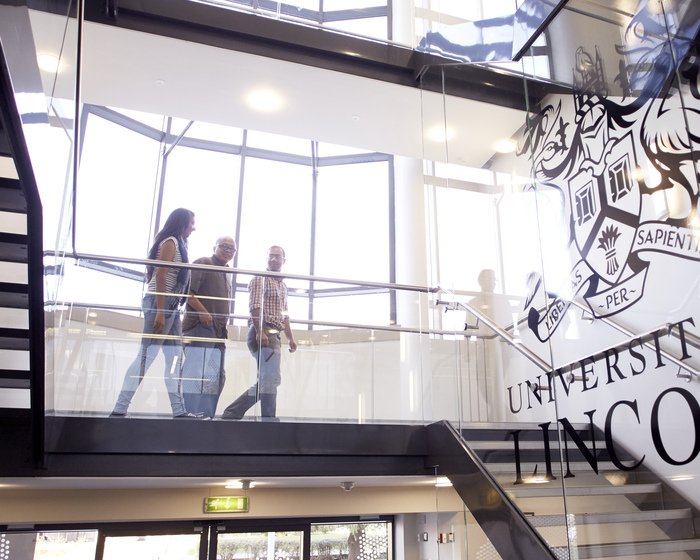/prod01/university-of-lincoln-cdn-pxl/media/responsive2017/images/course/coursebanner/Chemistry,1600X600.jpg )
Science Foundation Year
Chemistry Programmes
Study Chemistry and Forensic Science
The School of Chemistry at Lincoln brings together research-active academic staff and students in a vibrant research-driven environment with the aim of developing chemical innovation and chemists for the future.
At Lincoln, we aim to integrate the core chemistry disciplines with advanced topics aligned to the major scientific challenges of the 21st Century. These include nanoscience for new materials and devices, the chemistry-biology interface for drugs discovery, nuclear chemistry for safe energy generation, biotechnology for new manufacturing methods, and sensors for forensic medical and environmental applications.
Our Foundation Year programmers offer an alternative entry route into this exciting subject area.
Foundation Year Programmes (2024 Entry)
| Course Title | UCAS Code | Validation Status | Entry Requirements (A Level) | Entry Requirements (BTEC) | Entry Requirements (T Level) |
Additional Requirements (GCSE) |
| Chemistry with Science Foundation Year BSc | F101 | Validated | 64 UCAS Tariff points from a minimum of 2 A Levels | MPP (Merit, Pass, Pass) | Pass (D or E on the Core) | 3 GCSEs at grade 4(C) to include English and Maths |
| Chemistry with Science Foundation Year MChem | F103 | Validated | 64 UCAS Tariff points from a minimum of 2 A Levels | MPP (Merit, Pass, Pass) | Pass (D or E on the Core) | 3 GCSEs at grade 4(C) to include English and Maths |
| Chemistry for Drug Discovery and Development with Science Foundation Year BSc | F153 | Validated | 64 UCAS Tariff points from a minimum of 2 A Levels | MPP (Merit, Pass, Pass) | Pass (D or E on the Core) | 3 GCSEs at grade 4(C) to include English and Maths |
| Chemistry for Drug Discovery and Development with Science Foundation Year MChem | F154 | Validated | 64 UCAS Tariff points from a minimum of 2 A Levels | MPP (Merit, Pass, Pass) | Pass (D or E on the Core) | 3 GCSEs at grade 4(C) to include English and Maths |
| Chemistry with Education with Science Foundation Year BSc | F1X3 | Validated | 64 UCAS Tariff points from a minimum of 2 A Levels | MPP (Merit, Pass, Pass) | Pass (D or E on the Core) | 3 GCSEs at grade 4(C) to include English and Maths |
| Chemistry with Education with Science Foundation Year MChem | F1X4 | Validated | 64 UCAS Tariff points from a minimum of 2 A Levels | MPP (Merit, Pass, Pass) | Pass (D or E on the Core) | 3 GCSEs at grade 4(C) to include English and Maths |
| Chemistry with Mathematics with Science Foundation Year BSc | F1G3 | Validated | 64 UCAS Tariff points from a minimum of 2 A Levels | MPP (Merit, Pass, Pass) | Pass (D or E on the Core) | 3 GCSEs at grade 4(C) to include English and Maths |
| Chemistry with Mathematics with Science Foundation Year MChem | F1G4 | Validated | 64 UCAS Tariff points from a minimum of 2 A Levels | MPP (Merit, Pass, Pass) | Pass (D or E on the Core) | 3 GCSEs at grade 4(C) to include English and Maths |
| Forensic Chemistry with Science Foundation Year BSc | F1F6 | Validated | 64 UCAS Tariff points from a minimum of 2 A Levels | MPP (Merit, Pass, Pass) | Pass (D or E on the Core) | 3 GCSEs at grade 4(C) to include English and Maths |
| Forensic Chemistry with Science Foundation Year MChem | F1F7 | Validated | 64 UCAS Tariff points from a minimum of 2 A Levels | MPP (Merit, Pass, Pass) | Pass (D or E on the Core) | 3 GCSEs at grade 4(C) to include English and Maths |
| Forensic Science with Science Foundation Year BSc | F411 | Validated | 64 UCAS Tariff points from a minimum of 2 A Levels | MPP (Merit, Pass, Pass) | Pass (D or E on the Core) | 3 GCSEs at grade 4(C) to include English and Maths |
Please note that English language requirements for International students can be found on the full degree course pages for each programme.
Some programmes may also be available for part-time study.
How You Study
Students on all foundation programmes study a combination of core and subject-specific modules during the first year as part of an integrated degree programme. The combination of modules studied is tailored to the needs of the full degree programme that students wish to progress onto after successful completion of the foundation year.
Students study a core module at the start of the programme, which aims to introduce key study skills required for further study. Students study three further modules, which introduce fundamental aspects of specific areas of science and mathematics relevant to the chosen foundation year programme. Students also study an integrative module, which is aligned to the full degree programme which students' wish to progress onto upon successful completion of the Science Foundation Year.
Following successful completion of the Science Foundation Year, students will then progress onto the first undergraduate year of their chosen degree programme. This means students will study for a total of four years for a standard degree, or five years if they take an integrated Master’s degree. Students’ final awards upon graduating will reflect the full course title, for example “BSc Chemistry with Science Foundation Year”. Course specific information on degree programmes within the School of Chemistry can be found on our course pages.
Modules
Chemistry, Chemistry for Drug Discovery and Development, Chemistry with Education, Forensic Chemistry, Forensic Science:
Structure
All students study core modules:
- Study Skills
- Fundamentals of Mathematics
- Fundamentals of Chemistry
Students can also choose one of the following:
- Fundamentals of Biology
- Fundamentals of Physics
Students will also complete an integrative module:
- Foundation Year Chemistry
Following successful completion of the foundation year, students will then progress onto their chosen full degree programme.
Compulsory Modules
Study Skills
This core module is compulsory for all Science Foundation Year students. During the communication elements of the module, you will have the opportunity to develop your learning, group work and presentation skills, together with both written and verbal communication skills and ICT skills. The module will be assessed via submission of three pieces of coursework.
- A reflective commentary
- A group presentation
- A scientific essay
Fundamentals of Chemistry
This module is compulsory for students progressing into Chemistry, Life Sciences and Pharmacy degrees, and is an optional choice for those on Engineering degree paths. The aim of this module is to develop your knowledge on key areas of Organic, Inorganic and Physical Chemistry, whilst also developing key processing and problem-solving skills in an academically challenging yet supportive environment. Work within laboratory sessions also aim to increase your confidence in both working practically and analysing practical results.
Fundamentals of Mathematics
This module aims to develop the relevant problem solving and mathematical skills to provide a solid mathematical base to support future studies. The module will be assessed via regular submission of coursework questions and an end of year synoptic assessment.
Foundation Year Chemistry
This module aims to enable students to gain an understanding of their chosen degree and career path, as well as supporting them in their personal development as reflective learners and scientists. Shaped around a series of tutorials and seminars, students will explore current and future developments in chemistry and the chemical industry. At the same time they will reflect on their personal skills and traits relevant to their chosen careers, and will be supported in developing a reflective portfolio of evidence relating to these skills and traits.
Optional Modules
Students choose one of the following options:
Fundamentals of Biology
This module is compulsory for students progressing into Life Sciences and Pharmacy degrees and is an optional choice for those on Chemistry degree paths. The Fundamentals of Biology module aims to enable students to gain a solid understanding of a broad range of aspects of biology, in preparation for their chosen degree programme, within an academically challenging yet supportive environment. Practical classes in the laboratory and field aim to allow students to develop their skills in project management and data gathering, handling and interpretation.
Fundamentals of Physics
This module is compulsory for students progressing into Mathematics and Physics degrees, and is an optional choice for those on Engineering or Chemistry degree paths. The aim of this module is to recap and consolidate your knowledge on key areas of A-Level Physics, whilst also developing key processing and mathematical skills. Work within laboratory sessions also aim to increase your confidence in both working practically and analysing practical results.
Chemistry with Mathematics:
Structure
All students study core modules:
- Study Skills
- Applied Mathematics
- Mathematical Methods
Students will also study:
- Fundamentals of Chemistry
Students will also complete an integrative module:
- Foundation Year Chemistry
Following successful completion of the foundation year, students will then progress onto their chosen full degree programme.
Compulsory Modules
Study Skills
This core module is compulsory for all Science Foundation Year students. During the communication elements of the module, you will have the opportunity to develop your learning, group work and presentation skills, together with both written and verbal communication skills and ICT skills. The module will be assessed via submission of three pieces of coursework.
- A reflective commentary
- A group presentation
- A scientific essay
Applied Mathematics
This module aims to develop the relevant problem solving and mathematical skills to provide a solid mathematical base to support future studies. The module will be assessed via regular submission of coursework questions and an end of year synoptic assessment.
Mathematical Methods
The aim of this module is to recap and consolidate your knowledge in key areas of A Level Mathematics, whilst also developing key processing and problem solving skills.
Fundamentals of Chemistry
This module is compulsory for students progressing into Chemistry, Life Sciences and Pharmacy degrees, and is an optional choice for those on Engineering degree paths. The aim of this module is to develop your knowledge on key areas of Organic, Inorganic and Physical Chemistry, whilst also developing key processing and problem-solving skills in an academically challenging yet supportive environment. Work within laboratory sessions also aim to increase your confidence in both working practically and analysing practical results.
Foundation Year Chemistry
This module aims to enable students to gain an understanding of their chosen degree and career path, as well as supporting them in their personal development as reflective learners and scientists. Shaped around a series of tutorials and seminars, students will explore current and future developments in chemistry and the chemical industry. At the same time they will reflect on their personal skills and traits relevant to their chosen careers, and will be supported in developing a reflective portfolio of evidence relating to these skills and traits.
How You Are Assessed
The way students will be assessed on the foundation year will vary for each module. It could include coursework, such as a lab report or essay, an end of year synoptic assessment, portfolio development, group work, or presentations, to name some examples.
The tailored approach to teaching provided me with the bespoke knowledge needed to succeed at degree level, and four years later, I graduated with a First Class Honours in Forensic Science.
Gabriela Clarke
BSc (Hons) Forensic Science with a Foundation Year graduate



